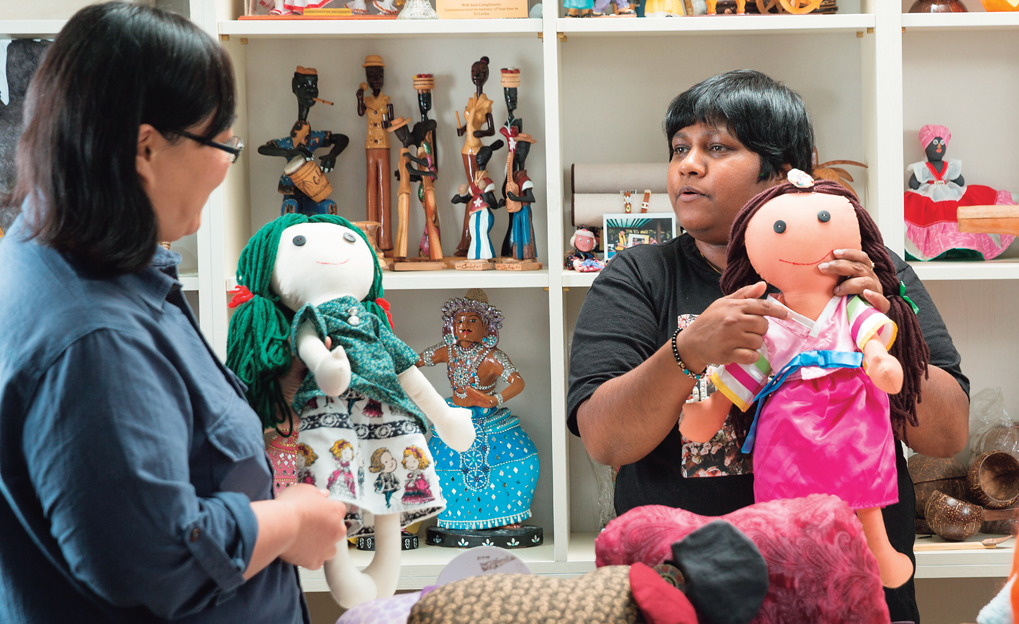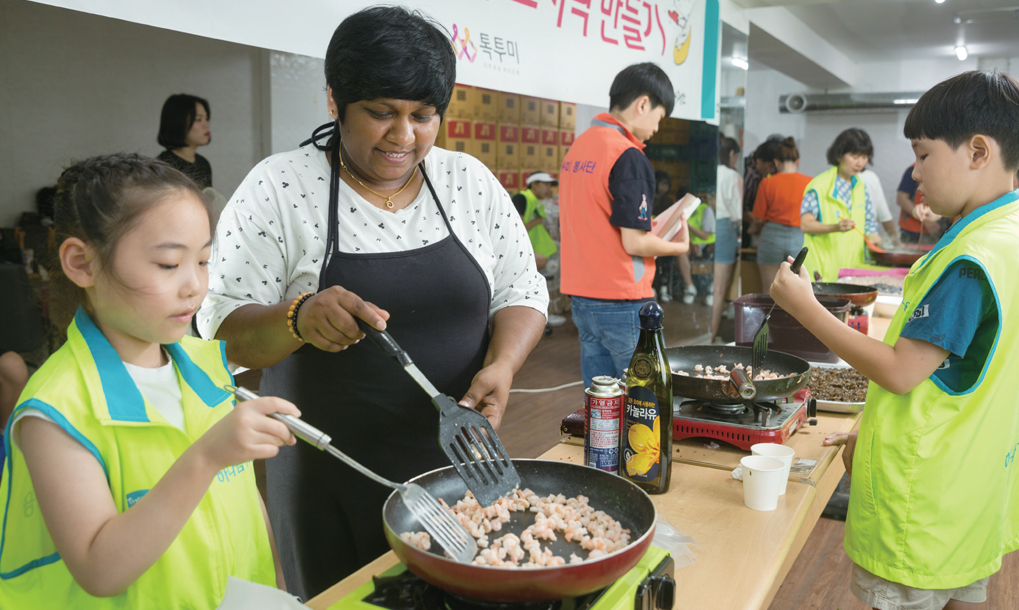Iresha Perera leads Talk to Me, a non-profit civic organization that assists people who are disadvantaged and discriminated against, regardless of nationality. Talk to Me aims to attain equal treatment and opportunities for them, and Perera’s primary tool is her effort to maximize the potential benefits of immigrant wives’ artistic talents.

The Monika Doll is one of the main endeavors of Talk to Me, a self-help organization of married immigrant women led by Iresha Perera. Anyone may visit the organization’s office and make the doll, which is sold to fund Talk to Me activities.
Over 300,000 immigrant wives currently live in Korea. International marriages are particularly prevalent in rural areas where one-fourth of all new marriages are between Korean husbands and immigrant wives. Most Koreans simply regard these women as foreigners who speak Korean awkwardly or, in some rare cases, fluently. But they should be viewed differently.
Most immigrant wives are now naturalized Korean citizens forming the pillars of the country’s multicultural families, which count around 800,000 members. They sacrificed nearly everything - their nationalities, jobs and even families - to become the wives of Korean men and have children with them.
Therefore, it may be said they are experiencing discrimination as a consequence of falling in love with Korea.
Their voices will grow increasingly louder as time goes on. Currently, Korea has over two million foreign-born residents, and the number of multicultural family members is expected to reach one million by 2020.
Adapt and Lead
Iresha Perera arrived in 1999 to work at a textile company in Seoul. Her plan was to gain experience in fashion design and leave Korea three months later. But the young Sri Lankan woman’s diligence and cheerfulness charmed her landlady, who subsequently introduced her to her son. Two years later they were married. “That’s how I settled in Korea. I must have been blinded by love,” explains Iresha, who asked me to address her by her given name.
Unfortunately, encounters with prejudice and discrimination soon quashed her marital bliss. Feeling overwhelmed by Koreans’ xenophobia, she returned to Sri Lanka.
Before long, her husband persuaded her to return to Korea, but when she did, she was determined to try a new approach. She soon established friendships with her neighbors in Anyang, a satellite city south of Seoul, especially with the elderly. “My elderly neighbors took a liking to me, and I could learn Korean fast by mingling with them,” she says. “That made my adjustment to Korean life far easier than before.” She formed a small volunteer group for her neighborhood and has been a longtime member of the residents’ autonomy committee in Anyang.
Iresha has become a national figure, too. For the past eight years, she has led Talk to Me, an association of immigrant wives. Starting in 2006 with fewer than 10 immigrant wives from Seoul and its satellite cities, it now has some 4,000 online and 500 offline members, making it the largest such organization in Korea.
“The organization’s name reflects its members’ wishes: come to us and begin a conversation with us,” Iresha says. “It is a self-help group comprised of women from different countries, including China, Japan, the Philippines, Russia, Thailand, Vietnam and Sri Lanka. We help immigrant wives adapt to life in Korea.”
If Iresha is not at the Talk to Me office in the heart of Seoul, she is frequently at TV and radio stations, either as a host or panelist, which helps to raise her national profile.
Self-Help Endeavors
Visitors to Talk to Me are enchanted by a broad array of “Monika Dolls,” one of the organization’s three main endeavors. “Monika” has a dual meaning. The dolls’ name suggests the international roots of their creators, and it sounds similar to the Korean word meonikka, meaning “because it is far away.” Talk to Me has produced over 7,000 Monika dolls, each with a different color and shape. “No two are the same,” Iresha says, adding that their appearances symbolize “unity amid diversity.” Sales revenue from the dolls goes to the organization’s activities.
“Monika dolls symbolize our intention to make the most of our cultural talents by using recycled materials,” Iresha says. “Anyone interested, foreigners or Koreans, can join us and make a doll simply by visiting us.” She adds that she and her colleagues at the association would like Koreans, both government officials and ordinary citizens, to regard them not as s of sympathy or people in need of one-sided support but as “equals who can help others and be helped by others.”
“Like many other immigrant wives, I will be buried in Korea after I die. What we want is to be regarded and treated as Koreans.”
Another of Talk to Me’s primary activities is “Multicultural Lunch,” a catering business offering a broad international menu. The proceeds support the association’s activities and extra food is used to provide free meals to elderly Koreans living alone.
The third important endeavor is the “Visiting Aunts’ Countries” program. Groups of volunteers visit children and schools in other countries to support them. A few years ago, for example, Talk to Me members and students of Ulsan University visited an elementary school in Sri Lanka and repaired its facilities and playgrounds. They have since maintained contact with the school’s students to encourage them to work hard to realize their dreams.
Iresha stresses that immigrant wives are no longer “aliens waiting for society’s support.” They are strong individuals who take care of their families, speak fluent Korean, and are passionate about their work. However, they are still faced with prejudices and discrimination, she says, because many Koreans assume they married Korean men to escape poverty.
Shattering Stereotypes
“It might have been true in the past but not anymore,” Iresha says, emphasizing that many financially independent immigrant wives can be found in the Seoul metropolitan area. “We are tax-paying Korean citizens, not foreigners who may be discriminated against and excluded. Sometimes, media outlets report about politicians or business magnates donating large sums of money or facilities for immigrants. But these contributions are often not distributed properly, or fail to benefit the most vulnerable. Such misguided welfare only ends up hurting immigrant wives and adversely affecting their views of Korean society. We may be minorities but we are never the socially weak.”
One of the biggest obstacles that these women face is getting jobs. “Employers are reluctant to hire us not because of our abilities but because of our skin colors. Sometimes, we volunteer free services at soup kitchens over the phone and the organizers welcome us. Upon our arrival, however, it’s not uncommon that we are turned away.”
Iresha knows firsthand about the employment hurdles. She still has not realized her dream that brought her to Korea 19 years ago - designing clothes. She particularly regrets the lack of educational support for ethnic minorities. “People from China, Vietnam and Thailand have a relatively good command of Korean but those from other countries, such as Sri Lanka, Myanmar and Bangladesh, are generally poor at Korean,” she says. “This is a huge problem because most of our problems stem from a lack of communication.”

Iresha Perera prepares mandu dumplings with other Talk to Me members and their children. They regularly visit the elderly who live alone and serve them free meals.
Policy Ineffectiveness
Iresha also has a lot to say about the Korean government’s multicultural policies, which have a reputation for being cursory and ineffective. “When the Seoul Metropolitan Government talks about multiculturalism, it mainly means spreading Korean culture to foreigners, especially people from less developed countries. I hope Koreans will become more open-minded and willing to accept other Asian cultures besides Chinese and Japanese culture.”
The intolerant mindset of Koreans, as Iresha sees it, will have a negative impact on Korea, especially given its rapidly aging population. She advises Koreans to adopt a more positive attitude and accept cultural differences, if for no other reason than to overcome the looming demographic crisis caused by decades of low birthrates.
“Like many other immigrant wives, I will be buried in Korea after I die. What we want is to be regarded and treated as Koreans,” Iresha says. Conceding that first-generation immigrants had tolerated discrimination against them, she adamantly cautions, “The second-generation immigrants, or the children of multicultural families, will not stand for it.”
Her appeals resonate loudly. Although the government is now paying more attention to children of mixed parentage, experts point out that Korea’s immigration policy is still a failure. Multiple studies have shown that as many as 70 percent of children of mixed parentage are forced to give up on their dreams due to their linguistic disadvantages and social discrimination. Some bicultural couples have reportedly given up forming a family altogether because they do not want their children to be subjected to the same sufferings they experienced.
Iresha hopes the Korean government will take better care of immigrant wives and their children, especially since many of the women are much younger than their husbands. “In the future, many of these women will have to become the breadwinners of their families,” she says.
Personal Plan
Asked about her own plans, Iresha says that she will continue her efforts until multicultural families in Korea, especially their children, receive a far better treatment. “What we are doing is mostly for our children,” she says. Iresha and her husband have two children. Her husband is engaged in an interior design business.
Iresha eloquently expressed her determination to do everything she can to improve the lives of immigrant wives, naturalized Koreans and guest workers, for that matter. Asked about whether she would enter politics if given an opportunity, she says “yes,” but not if political parties invite her simply for cosmetic purposes. Iresha points out that Jasmine Lee, the Philippine-born immigrant wife who became a member of Korea’s National Assembly, was not given sufficient opportunities to accomplish her agenda.
Despite her hectic schedule, Iresha is compelled to take care of her household almost single-handedly. That explains why she was reluctant to give this interview after work or on a weekend. “I only sleep a few hours a day. But I try to do all household chores myself as far as circumstances allow,” she says.
Iresha’s mother-in-law, her one-time landlady, should probably consider herself lucky.
Choi Sung-jinExecutive Editor, Korea Biomedical Review
Ha Ji-kwonPhotographer